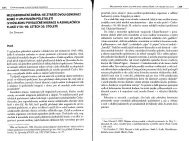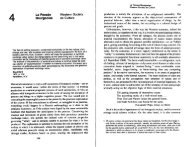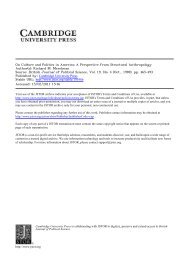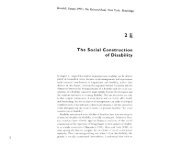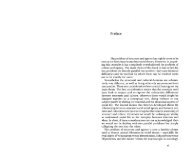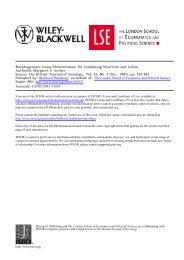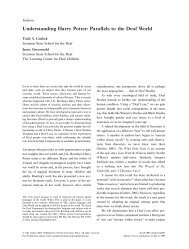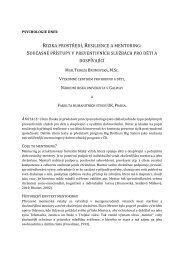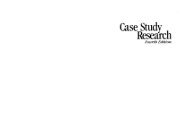Culture and Practical Reason Two Paradigms of ... - Moodle
Culture and Practical Reason Two Paradigms of ... - Moodle
Culture and Practical Reason Two Paradigms of ... - Moodle
- No tags were found...
You also want an ePaper? Increase the reach of your titles
YUMPU automatically turns print PDFs into web optimized ePapers that Google loves.
Chapter <strong>Two</strong> 84 CUlture <strong>and</strong> <strong>Practical</strong> <strong>Reason</strong><strong>Two</strong> <strong>Paradigms</strong> <strong>of</strong> Anthropological Theory85some lesser claim to existence <strong>and</strong> analysis than the behavior motivated byan enlightened self-interest. Still the act-the "wild dances," the exchanges<strong>of</strong> kula ornaments that could not be possessed-remains peculiarin observable properties, <strong>and</strong> to privilege it over the rule in the name <strong>of</strong>rational interest would require a second distinction: between that outward,incongruous form <strong>and</strong> the practical attitudes the people bring to it. Thetruest data <strong>of</strong> ethnography consist not in facts <strong>of</strong> cultural order but in theway that order is subjectively lived, the famous "imponderabilia <strong>of</strong> everydaylife." Anthropologists are too frequently taken in, Malinowski insists,by the natives' retailing <strong>of</strong> "legal fictions" such as the solidarity <strong>of</strong>the clan,rules <strong>of</strong>clan exogamy, <strong>and</strong> the like, which represent only the''intellectual,overt, fully conventionalized aspect <strong>of</strong> the native attitude." But "thenatural, impulsive code <strong>of</strong> conduct, the evasions, the compromises <strong>and</strong>non-legal usages are revealed only to the field worker who observes nativelife directly, registers facts, lives at such close quarters with his 'material' asto underst<strong>and</strong> not only their language <strong>and</strong> their statements, but also the hiddenmotives <strong>of</strong> behaviour, <strong>and</strong> the hardly ever formulated spontaneous line<strong>of</strong>conduct" (Malinowski 1966 [1926], pp. 120-21). The importance <strong>of</strong> this"natural, impulsive code" is that in the end it prevails over the conventional:in the end, the cultural form submits to the "spontaneous" praxis."The true problem is not to study how human life submits to rules-itsimply does not: the real problem is how the rules become adapted to life"(ibid., p. 127).23By thus separating the cultural order from the human subject as fiction isseparated from real life, Malinowski introduces a type <strong>of</strong> ontologicalschizophrenia into ethnology-which happens to be the normal social sciencethought <strong>of</strong> our time. Human social life is taken to be divided against23. Fones acutely describes the opposition between "ideal" norm <strong>and</strong> "real" practice inMalinowski's work, <strong>and</strong> documents its transposition into a contrast <strong>of</strong> form <strong>and</strong> senti·ment, which left no possibility <strong>of</strong> understnading kinship, for example, as a system in itsown right: "What is significant is the emphasis on practice (the activity; the behaviour;the concrete mutual services; the exhibited self·interest, ambition, <strong>and</strong> vanity; the facts<strong>of</strong> mother love <strong>and</strong> paternal affection; in shon the actions <strong>and</strong> feelings <strong>and</strong> thoughts <strong>of</strong>individuals in social situations, as directly observed by the ethnographer <strong>and</strong> as admittedby the actors) as the 'reality' <strong>of</strong> social life, as against 'ideal,' or 'theory,' the merelyverbal formulation (Fortes 1957, p. 160) ... The facts <strong>of</strong> social relationship <strong>and</strong> socialgrouping are, in his scheme, merely facts <strong>of</strong> custom <strong>and</strong> motive broadly on a par with,for instance, magical beliefs. <strong>and</strong> springing in the last resort from such universal humaninstincts as those <strong>of</strong> parenthood or such common human sentiments as vanity <strong>and</strong> ambi·tion. So we have nowhere a connected analysis <strong>of</strong> Trobri<strong>and</strong> local organization, kinship,<strong>and</strong> political structure" (p. 164).itself, composed <strong>of</strong> two different kinds <strong>of</strong> object st<strong>and</strong>ing in relations <strong>of</strong>counterposition <strong>and</strong> competition. On one h<strong>and</strong>, there are the conventionalrules <strong>and</strong> forms which amount to "the culture" <strong>of</strong>the situation. They alonehave the right to that status, as they alone are described by specificallycultural properties: matrilineal descent, clan exogamy, mortuary rituals,affinal payments <strong>of</strong> valuables, yam production, classificatory kinship. Inprinciple they might also be comprehended that way; that is, by a logic atonce <strong>of</strong> significance <strong>and</strong> action. developed from the symbolic attributesasthe valuation <strong>of</strong> goods <strong>and</strong> the division <strong>of</strong> labor, for example, may berelated to kinship classifications or marriage practices. But the identification<strong>of</strong> the cultural attributes as the "norm" or the "ideal" vis-a-vis "reallife" must condemn such an effort as metaphysical. <strong>Culture</strong> is insteadsubordinated to another logic-which as it does not preserve the symbolicproperties cannot either give an account <strong>of</strong> them. 24 Opposed to the culturenorm, on the other h<strong>and</strong>, is the' 'actual behavior" <strong>of</strong> the people. And this,as specifically human, must be described <strong>and</strong> understood in terms drawnfrom another universe <strong>of</strong> discourse: the people's needs, drives, motives,desires, feelings, <strong>and</strong> sentiments. At this point, in a sort <strong>of</strong> basic inversion<strong>of</strong> Durkheimian principles, although still in agreement with the premisethat "man is double," Malinowski displaces the social dynamic onto thenatural level, seeking to account for it by forces emanating from the organismitself. We have to deal with the struggle <strong>of</strong> the individual subject toachieve his own ends in the face <strong>of</strong> constraining cultural conventions.Meaningful analysis thus gives way to manipulative rationality, to theformal analysis <strong>of</strong> means-ends relations based on an eternal teleology <strong>of</strong>human satisfactions. From this alternate vantage, culture appears simply asa medium or an environment <strong>of</strong> the constituting dynamic <strong>of</strong> human purpose.It is a medium in the sense <strong>of</strong> a set <strong>of</strong> means at the disposition <strong>of</strong> thesubject, through which he achieves his self-appointed ends. And it is anenvironment, not merely as a set <strong>of</strong> constraints external to the individual,but as something upon which he works his intentions <strong>and</strong> in so doing ordersthe properties <strong>of</strong> this milieu. 25 So conceived, the interaction between24. Sorokin correctly characterizes the procedure as "the fallacy <strong>of</strong> logical inadequacy"cited with approval by Parsons <strong>and</strong> described thus: "It is to explain a body <strong>of</strong> fact withproperties clearly differentiating it from others, in terms <strong>of</strong> a schema applicable to theothers in the same way" (Parsons 1968 [1937) 1:354). The same fallacy applies toecologisin as well as economism (utilitarianism), as we shall see in a moment.25. "The problems set by man's nutritive, reproductive, <strong>and</strong> hygienic needs must be solved.They are solved by the construction <strong>of</strong> a new, secondary, or artificial environment. This



